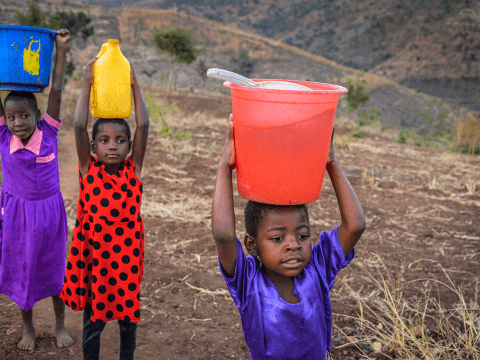Access to clean water is essential for helping girls to stay in school

Melon, like many girls in Rakai District, central Uganda, is thrilled to have access to clean water at school. In many developing countries, lack of access to clean water can stand in the way of a girl’s right to education and protection because girls are often responsible for fetching water for their families.
The gruelling and lengthy walk for water can expose girls to violence, keep them from attending class, and cause physical exhaustion. Furthermore, in rural communities, water is often collected from contaminated sources, exposing families to life-threatening illnesses like cholera and typhoid. These illnesses put added strain on healthcare systems and keep even more children out of school.

A fountain of hope
In Uganda, where traditional gender norms often define girls’ roles and responsibilities, the struggle to access clean water means that many girls are held back from reaching their full potential. But now, thanks to World Vision’s community integrated interventions, new water posts in schools and healthcare clinics are changing lives for many, including 10-year-old Melon.
“We have drinking water in our school!” says Melon with a smile. “I am very happy to attend school to learn.”
Melon is one of many girls benefitting from new water points that allow girls to fetch clean water without having to drop out of school. She now has a safe, comfortable environment to use the bathroom at school, thanks to four newly-built blocks of gender-separate latrines equipped with proper hand-washing facilities. She dreams of becoming a doctor.
With World Vision’s work bridging the divide between boys and girls in Rakai by encouraging the community to work together, as well as by providing training for women and girls, this dream – and the dreams of many other girls – might soon become a reality.
“World Vision teaches us about the rights of children,” says Joseph, Melon’s father and a member of Ggalyawamu Household Cluster. “We must ensure the health and the education of our children and protect them. We learn to view girls’ and boys’ rights the same. I now attach more importance to the education of my daughters. We are full of hope.”
World Vision has developed a clustering approach to empower households to be in charge of their development agenda. The community-focused approach dubbed the Household Empowerment Approach, brings together 10 to 20 households in densely populated communities and five to 10 in sparsely populated communities. The approach promotes different aspects of child wellbeing, including health, education, livelihoods, and child protection at the household level.
Launched in 2017, the approach also promotes community mobilisation, engagement, and accountability using participatory principles. It equips and strengthens families and caregivers to be the first line of protection and care for children. It also strengthens linkages and engagements between household members and their local governments as well as Civil Society Organisations for quality service delivery.
Keeping girls in school ends child marriage

One of the most effective ways to combat child marriage is to keep girls in school. It is proven that girls who receive higher education are less likely to be married off before they are 18 years of age. When a girl is educated, she will delay marriage, have fewer and healthier children, and earn a higher income.
Access to clean water, sanitation, and hygiene (WASH) is essential for children in schools, particularly for girls as well as children with disabilities. Contaminated water, poor sanitation, or unhealthy hygiene behaviours increase the risk of contracting diarrhoea and other WASH-related diseases, making it more difficult for children to stay in school and become empowered through education.
This is an even greater challenge for girls – especially girls who are menstruating – as they often face more barriers to enrol, stay in school, learn, and perform. When proper sanitation is available, 11% more girls attend school.
During the time you’ve been reading this, 140 girls have been married. Girls who should be worried about passing exams, not pregnancy. Girls who should be excited about what their future holds, not terrified.
Help put a stop to child marriage by sending a girl to school. Change is possible if we work together to end what is considered ‘normal’ for millions around the world. Join the global movement to end violence against children, to ensure girls are talking about raising their hand at school and not giving their hand in marriage. Learn more here: https://www.wvi.org/it-takes-uganda-end-violence-against-children
#ittakesaworld
----
Story by: Humphreys Mukaga, Hygiene & Sanitation Assistant and Fred Ouma, Development Communications Coordinator, World Vision Uganda